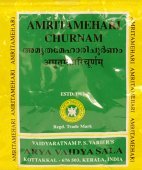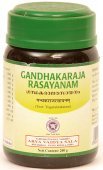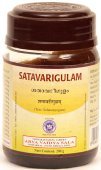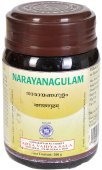Dhatri, Dhātrī, Dhātṛ, Dhātri: 35 definitions
Introduction:
Dhatri means something in Hinduism, Sanskrit, Jainism, Prakrit, the history of ancient India, Marathi, Hindi, biology. If you want to know the exact meaning, history, etymology or English translation of this term then check out the descriptions on this page. Add your comment or reference to a book if you want to contribute to this summary article.
Dhatri has 33 English definitions available.
The Sanskrit term Dhātṛ can be transliterated into English as Dhatr or Dhatri, using the IAST transliteration scheme (?).
Languages of India and abroad
Sanskrit dictionary
[Deutsch Wörterbuch]
Source: Cologne Digital Sanskrit Dictionaries: Böhtlingk and Roth Grosses Petersburger WörterbuchDhātrī (धात्री):—f.
1) Amme [Amarakoṣa 3, 4, 25, 178.] [Hemacandra’s Abhidhānacintāmaṇi 558.] [Anekārthasaṃgraha 2, 432.] [Medinīkoṣa r. 49.] [Mahābhārata 1, 3348. fg. 3, 2275. 2580. 8851.] [Rāmāyaṇa 1, 39, 18 (Gorresio 40, 18).] [Suśruta 1. 2. 13. 371, 14. 373, 1. 2, 105, 15.] [Mṛcchakaṭikā 61, 4.] [Raghuvaṃśa 3, 25.] [Kumārasaṃbhava 7, 25.] [Varāhamihira’s Bṛhajjātaka S. 50, 37. 77, 9.] [Bhāgavatapurāṇa 3, 2, 23. 6, 14, 45.] Vgl. kṣīra . Hierher ist viell. auch jagaddhātrī (s. u. jagaddhātar) zu ziehen, doch könnte in diesem comp. dhātrī auch f. zu 1. dhātar sein. —
2) Mutter [Hemacandra’s Anekārthasaṃgraha] [Medinīkoṣa] punardhātrīṃ punargarbhamojastasya pradhāvati . aṣṭame māsyato garbho jātaḥ prāṇairviyujyate [Yājñavalkya’s Gesetzbuch 3, 82.] —
3) die Erde [Amarakoṣa] [Trikāṇḍaśeṣa 3, 3, 356.] [Hemacandra’s Abhidhānacintāmaṇi 935.] [Hemacandra’s Anekārthasaṃgraha] [Medinīkoṣa] [Mahābhārata 11, 215.] [Harivaṃśa 12019.] [Varāhamihira’s Bṛhajjātaka S. 5, 78. 9, 24. 10, 1. 36, 1.] [Sūryasiddhānta 12, 36.] Inschr. in [Journ. of the Am. Or. S. 7, 26, 16.] —
4) Emblica officinalis Gaertn., Myrobalane (viell. wegen des Saftreichthums der Frucht so genannt) [Amarakoṣa] [Trikāṇḍaśeṣa] [Hemacandra’s Abhidhānacintāmaṇi 1145.] [Hemacandra’s Anekārthasaṃgraha] [Medinīkoṣa] [Hārāvalī 92.] [Suśruta 1, 162, 10. 228, 19. 2, 50, 21. 151, 20. 340, 1. 359, 15. 467, 21.] [Varāhamihira’s Bṛhajjātaka S. 54, 14. 75, 6.] dhātri wegen des Metrums [Suśruta 2, 324, 13. 327, 12.] Vgl. kṣudradhātrī, kāṣṭhadhātrīphala . — Geht wohl aller Wahrscheinlichkeit nach auf 3. dhā zurück; vgl. dhāyas . Nach [Pāṇini’s acht Bücher 3, 2, 181] ist dhātrī f. zu dhātra und bezeichnet nicht den Agens, sondern das Object (an der man saugt) der durch dhā ausgedrückten Thätigkeit.
--- OR ---
Dhātrī (धात्री):—
1) Hebamme [Spr. 765.] Wärterin [Mahābhārata 5, 7423.] —
2) kukṣisaṃdhāraṇāddhātrī (smṛtā) [Mahābhārata 12, 9512.] —
4) [Oxforder Handschriften 16,a, Nalopākhyāna 2.]
Source: Cologne Digital Sanskrit Dictionaries: Sanskrit-Wörterbuch in kürzerer FassungDhātri (धात्रि):—(metrisch) f. = dhātri Emblica officinalis.
--- OR ---
Dhātrī (धात्री):—s.u. dhātar.
Sanskrit, also spelled संस्कृतम् (saṃskṛtam), is an ancient language of India commonly seen as the grandmother of the Indo-European language family (even English!). Closely allied with Prakrit and Pali, Sanskrit is more exhaustive in both grammar and terms and has the most extensive collection of literature in the world, greatly surpassing its sister-languages Greek and Latin.
See also (Relevant definitions)
Starts with (+4): Dhatri phala, Dhatribhavana, Dhatridhara, Dhatrihavana, Dhatrika, Dhatrike, Dhatrikota, Dhatrilakshana, Dhatrilauha, Dhatrimodaka, Dhatripala, Dhatripatra, Dhatripattra, Dhatriphal, Dhatriphala, Dhatripujanamahatmya, Dhatripushpi, Dhatripushpika, Dhatriputra, Dhatriputtra.
Ends with (+26): Abhidhatri, Adhatri, Amsadhatri, Anagatavidhatri, Ankadhatri, Ashvastanavidhatri, Avadhatri, Bhudhatri, Bhutadhatri, Brihaddhatri, Candramshadhatri, Dehadhatri, Dharmadhatri, Hastadhatri, Hriddhatri, Jagaddhatri, Jivadhatri, Kshiradhatri, Kshudradhatri, Lokadhatri.
Full-text (+124): Dhatriphala, Bhutadhatri, Jagaddhatri, Dhatriputra, Dhatripushpika, Kshiradhatri, Vidhatri, Vishadhatri, Dhatrika, Dhatra, Saudhataki, Dhatupushpika, Kashthadhatriphala, Lokadhatri, Maladhatri, Dhatreyi, Dhatriputtra, Dasharnaka, Dhatrike, Dhatri phala.
Relevant text
Search found 53 books and stories containing Dhatri, Dhātrī, Dhātṛ, Dhātri; (plurals include: Dhatris, Dhātrīs, Dhātṛs, Dhātris). You can also click to the full overview containing English textual excerpts. Below are direct links for the most relevant articles:
The Padma Purana (by N.A. Deshpande)
Chapter 24 - The Greatness of Tulasī and Dhātrī < [Section 7 - Kriyāyogasāra-Khaṇḍa (Section on Essence of Yoga by Works)]
Chapter 105 - The Greatness of Dhātrī and Tulasī < [Section 6 - Uttara-Khaṇḍa (Concluding Section)]
Chapter 121 - The Importance of Offering Lights etc. < [Section 6 - Uttara-Khaṇḍa (Concluding Section)]
The Garuda Purana (by Manmatha Nath Dutt)
Chapter CXCV - Medical treatment of female complaints < [Dhanvantari Samhita]
Chapter CXXXIV - Maha Kausika Vratas etc < [Brihaspati (Nitisara) Samhita]
Chapter CXCIV - Medical treatments of Sinus etc < [Dhanvantari Samhita]
The Agni Purana (by N. Gangadharan)
Chapter 279 - The description of the potent remedies (siddha-auṣadha)
Chapter 141 - Description of herbs used in charms, medicines etc.
Garga Samhita (English) (by Danavir Goswami)
Verse 4.19.117 < [Chapter 19 - A Thousand Names of Srī Yamunā]
The Skanda Purana (by G. V. Tagare)
Chapter 12 - The Efficacy of Dhātrī < [Section 4 - Kārttikamāsa-māhātmya]
Chapter 23 - The Origin of Dhātrī and Tulasī < [Section 4 - Kārttikamāsa-māhātmya]
Chapter 191 - The Greatness of Dvādaśāditya Tīrtha < [Section 3 - Revā-khaṇḍa]
The Tattvasangraha [with commentary] (by Ganganatha Jha)
Verse 723-726 < [Chapter 13 - Examination of Sāmānya (the ‘universal’)]
Verse 1051 < [Chapter 16 - Examination of the Import of Words]
Related products
(+18 more products available)





